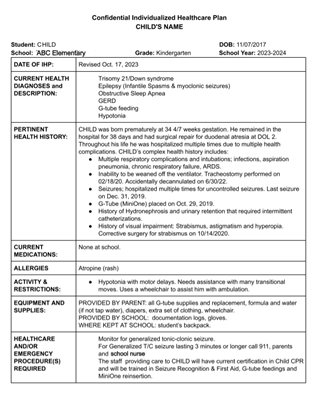
Personalized Health Plans: Tailoring Care for Individuals
In the ever-evolving landscape of healthcare, the shift towards personalized and individualized care plans is gaining momentum. Recognizing the unique needs of each patient is crucial in providing effective and targeted healthcare solutions. Here, we delve into the significance of individualized care plans and how they contribute to enhanced well-being.
Understanding the Need for Personalization
Healthcare is not a one-size-fits-all endeavor. Every individual is unique, with distinct genetic makeup, lifestyle choices, and health histories. Recognizing and embracing this individuality is the cornerstone of personalized health plans. By understanding each patient’s specific needs, healthcare providers can deliver more precise and effective interventions.
Tailoring Care Plans to Genetic Makeup
Advancements in genetic research have opened new frontiers in personalized healthcare. Tailoring care plans to an individual’s genetic makeup allows healthcare professionals to identify potential genetic predispositions, enabling early intervention and preventive measures. This targeted approach has the potential to revolutionize disease management and improve overall health outcomes.
Considering Lifestyle Factors in Care Plans
Lifestyle choices play a significant role in determining an individual’s health. Personalized care plans take into account factors such as diet, exercise, stress levels, and sleep patterns. By addressing these lifestyle elements, healthcare providers can create comprehensive plans that empower individuals to make positive changes and maintain a healthier lifestyle.
The Role of Technology in Personalized Healthcare
Technological advancements have paved the way for innovative solutions in personalized healthcare. Wearable devices, health apps, and remote monitoring tools enable individuals to actively participate in their care plans. These technologies provide real-time data, allowing healthcare providers to make informed decisions and adjustments to the personalized care plans as needed.
Enhancing Patient Engagement and Empowerment
Personalized care plans foster a stronger sense of engagement and empowerment among patients. When individuals feel that their unique needs are being acknowledged and addressed, they are more likely to actively participate in their healthcare journey. This collaborative approach can lead to better adherence to treatment plans and improved overall health outcomes.
Challenges and Considerations in Implementing Individualized Care Plans
While the concept of individualized care plans holds great promise, there are challenges in implementing such an approach on a broader scale. Factors like resource constraints, data privacy concerns, and the need for standardized protocols pose obstacles that healthcare systems must navigate to ensure the widespread success of personalized healthcare.
Individualized Care Plans: A Path to a Healthier Future
In conclusion, the move towards individualized care plans signifies a paradigm shift in healthcare. By acknowledging and addressing the unique aspects of each individual, healthcare providers can unlock new possibilities for preventive care, early intervention, and overall well-being. The integration of personalized healthcare is a positive step towards a future where healthcare is truly tailored to the individual.
To learn more about the benefits of Individualized Care Plans, visit www.dead-samurai.com.
